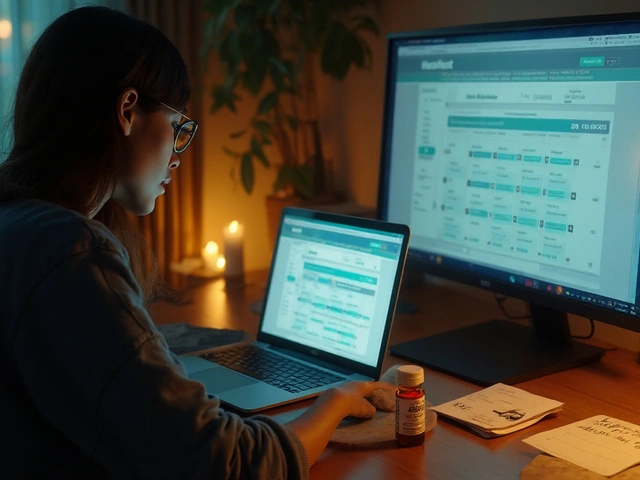You hear the word "Ativan," and maybe you think of a pharmacy bottle in the back of someone’s medicine cabinet. Or a whispered conversation about getting through a rough patch. But what if I told you that in Australia alone, prescriptions for Ativan — or lorazepam, as doctors call it — have quietly risen more than 15% in the past five years? Anxiety feels like it’s everywhere these days, and Ativan has become a go-to support for many people trying to keep things together at work, at home, and everywhere between.
What Is Ativan and How Does It Work?
Ativan is the brand name for lorazepam, part of the benzodiazepine family. It’s not some magic happiness pill. Instead, it tweaks the brain chemicals that handle stress, quieting the noise. If you’ve ever felt like your heart was a runaway train during a panic attack or had your thoughts racing at 2 a.m., you get why something like Ativan might feel like a lifeline.
This medication mainly boosts the effect of GABA, a neurotransmitter that calms down nervous system activity. Picture someone tapping the brakes instead of the accelerator. That's what Ativan does — it slows things down. Though it starts acting fast (usually within 20-30 minutes after swallowing a tablet), its calming effects don’t last as long as some other sedatives, with most people feeling back to baseline in 6 to 8 hours.
Doctors in Melbourne and across Australia give Ativan for anxiety, but also for insomnia tied to anxiety, certain muscle spasms, and as a sedative before surgery. It's not just for adults either — sometimes, it's used in short bursts for kids experiencing severe anxiety before medical procedures (strictly under medical supervision). The Royal Australian and New Zealand College of Psychiatrists warns that it should usually stay a short-term fix, not a life-long crutch.
Here’s something a lot of people get wrong: Ativan doesn’t cure anxiety. It just turns the volume down on the symptoms. That means it’s a tool in the box, not the only answer. Some users get so much relief, though, they risk wanting to use it every day without looking for longer-term strategies, like therapy.
Surprisingly, your body adjusts to Ativan quickly. A clinical review published in the "Australian Prescriber" found that even a few weeks of steady use can lead to tolerance—meaning your regular dose might stop working as well, pushing people to take more for the same calm feeling. That’s a slippery slope toward dependence, a word most people don’t ever want to hear from their GP.
If you’re ever prescribed Ativan, don’t be shy about asking the doctor, “How long should I actually use this?” or “What’s the game plan after I stop?” Clarity and planning go a long way in keeping your mental health on track.
This isn’t a rare prescription either. The most recent figures from the Therapeutic Goods Administration (TGA) show that lorazepam is in the top 10 most dispensed anti-anxiety meds across Australia. Doctors know it works — but they also want patients to know it’s not a forever solution.

Risks, Side Effects, and How to Recognize Trouble
Ativan comes with a few catches. The immediate one is side effects. Most people will feel drowsy — that’s the most common one — but it can morph into dizziness, headaches, trouble concentrating, blurred vision, or even a sense of being detached from reality. Ever walked into a room and wondered what you came in for? Now imagine that, but it lasts for hours after taking a pill.
Driving or operating machinery isn’t the best idea once Ativan’s in your system. Australian driving regulations are clear: if you’re caught driving "under the influence" due to a prescribed sedative, you can still lose your license. Sleepiness, slowed reaction times, and poor judgement all show up, especially during the first days on the medication or if you missed a good night’s sleep. Even after the first dose, don’t assume you can just soldier on without feeling the impact.
The deeper risk is dependency, especially with longer use. With regular use for more than a few weeks, the body and mind can start treating Ativan like a necessary part of daily routine. If someone stops suddenly, withdrawal symptoms can hit hard: strong anxiety, sleeplessness, a pounding heart, and at its worst, seizures. That’s not scare-mongering — it’s well documented in medical literature. One memorable quote from the Royal Melbourne Hospital Detox Program:
“Benzodiazepine withdrawal isn’t about discomfort – it can get dangerous fast, and always needs a doctor’s support.”
Not everyone will get addicted, but unpredictable things happen. A mate of mine, who’d only planned to take Ativan for a fortnight after a breakup, found himself popping them five months later, still feeling anxious, and needing a doctor-led taper to safely quit. That’s when it really sinks in that this stuff isn’t just a quick fix.
Watch out for what’s called paradoxical effects — that’s when, instead of calming you down, Ativan makes your anxiety or agitation worse. Kids, older adults, and people with mental health issues are especially at risk. If mood swings, increased aggression, or new confusion pop up, call your GP. It’s not common, but it’s not unheard of either.
Mixing Ativan with alcohol or other sedatives can put you in real danger. The combination ramps up the risk of slowed breathing, which can turn lethal. People sometimes forget that over-the-counter cold meds or some painkillers can interact in similar ways, so double-check with a pharmacist before adding anything new to the mix.
If you have a history of substance use or previous struggles with alcohol or sleeping pills, let your provider know up front. Withholding that info increases the chance of something going wrong down the track. For older folks, the risks get even higher — falls, broken bones, and serious confusion are much more common in elderly patients on Ativan. The government’s "Choosing Wisely Australia" campaign actively reminds doctors to keep benzodiazepine prescriptions short for this reason.
One often-overlooked aspect: Ativan can cause memory issues. Called "anterograde amnesia," it means you might struggle to remember things that happened while under the medication’s effects. This is especially noticeable if used before medical or dental procedures.
Here’s a quick list of things to watch if you’re taking Ativan:
- Don’t drive, especially until you know how you react to the dose.
- Never mix with alcohol or other sedatives.
- If you notice increasing anxiety or mood swings, talk to your doctor.
- Stick to exactly what’s prescribed. Resist the urge to take more on a stressful day.
- If you miss a dose, don’t double up. Just continue as scheduled.
It’s always more intimidating to ask for help than it should be. But if you suspect you’re becoming dependent or feeling unpredictable side effects, talking to your GP is way better than hiding it or trying to stop on your own.

Smart Ways to Use Ativan and Explore Alternatives
If your doctor hands you a script for Ativan, there’s usually a plan that goes beyond the script pad. Most GPs in Australia try to use "lowest dose, shortest time" as their golden rule. Psychiatrist Dr. Emma Foster says, "We want patients to use Ativan for acute anxiety or one-off stressors, not months on end if we can avoid it."
Take the pill exactly as told. That might mean a single dose during a panic attack or before a particularly anxiety-provoking event — say, an MRI scan or a tough family court hearing. Keeping a diary of how often you take Ativan and how you feel afterwards is way more useful than you might think. Patterns emerge, and you’ll quickly spot if using Ativan is turning into a habit or if it’s genuinely helping during peaks of distress.
There’s no gold medal for gritting your teeth and suffering in silence, but there’s also risk in taking Ativan without a bigger-picture plan for treating anxiety. For medium or long-term anxiety, doctors often pivot towards cognitive behavioural therapy (CBT), mindfulness strategies, or sometimes, non-benzodiazepine medications like SSRIs. These approaches may not have the instant chill of Ativan, but they build resilience that sticks long after the last session or dose.
In Melbourne, it’s easier than ever to tap into mental health resources without the old stigma. The "Head to Health" program lines up psychologists, counsellors, and peer support groups — some in person, some online — so people can try out what feels right. If you find talking to a stranger confronting, online tools like "Smiling Mind" or "myCompass" offer step-by-step guides to handling anxious thoughts without ever stepping foot in an office.
Diet, exercise, and sleep may sound trite, but recent research out of Monash University confirms that people who combine these factors with medication and therapy see anxiety symptoms drop more than twice as fast as those who only rely on medicine. It’s not about kale smoothies and marathons, but even a twenty-minute walk near the Yarra River can help regulate stressed-out brains.
For parents, Ativan is rarely a first-line answer for kids. Doctors focus more on skill-building and support networks unless anxiety hits disabling levels. In those tricky cases, specialists like CAMHS (Child and Adolescent Mental Health Services) step in, and Ativan may only be used for a day or two around pinpointed stressors. The aim is always to teach coping skills, not just hand out pills.
People going through medical procedures — like a tricky dental surgery or an MRI — sometimes use Ativan once or twice to get through it calmly. Surgeons and anaesthetists are mindful of dosing, watching for any reactions and making sure you’re not left too groggy after the fact. Construction worker Theo, who took Ativan before his wisdom teeth removal, describes it like this: "It felt like the world slowed down, but I wasn’t knocked out; just… less scared."
Quick tips for anyone considering or using Ativan:
- Ask your doctor about a weaning plan before you even start, especially if there’s a chance of longer use.
- Let someone close to you know you’re taking Ativan, so they can watch for any changes you might miss yourself.
- Set a regular time to check in with your healthcare provider about how it's going, even if that’s a five-minute phone call.
- Mixing Ativan with recreational drugs isn’t just risky — it’s a trip to the emergency room waiting to happen.
- Keep meds locked away if you have children or curious housemates around.
There’s one last thing to remember. For many, Ativan does exactly what it’s meant to: helps you through a rough patch or a sleepless night. But if it starts to feel like the only way to get through the week, that’s your cue to talk options — not just search for another refill. Help is closer than you might think, and finding the right balance is a lot more common (and possible) than you might expect.







June 11, 2025 AT 03:54
Listen up, Ativan might seem like a quick fix, but in my community we balance it with yoga and breathing drills. The drug works by enhancing GABA, which slows the brain's chatter, but you can't rely on it forever. Short‑term use is fine, yet tolerence can sneak up faster than a monsoon. Make sure you talk to your doc about a clear taper plan before you even start. And remember, a healthy diet and regular meditation can keep the anxiety at bay without the pill.